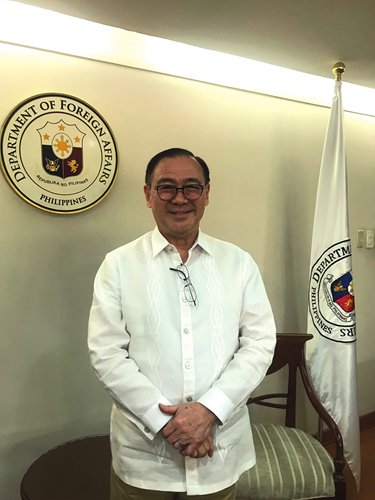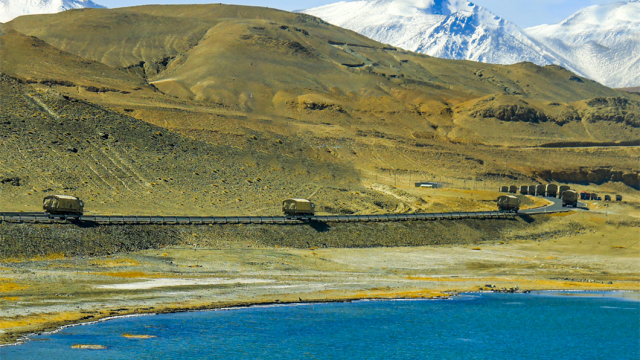
Teodoro Locsin Jr. Photo: Yu Jincui/GT
Editor's Note:
The Philippines and China have embraced a strong rapprochement since President Rodrigo Duterte assumed office and re-engaged in dialogue over the South China Sea issue. But with the US as its military ally and China as its biggest trading partner, how the Philippines balances ties with the two major powers has been closely watched by international relations observers. Will the momentum in bilateral relations last? How does the Philippines define its relations with China and the US? A delegation of Global Times (GT) reporters recently talked to Philippine Foreign Affairs Secretary Teodoro Locsin Jr. (Locsin) on these issues.
GT: Since President Duterte assumed office, China-Philippine relations have been developing on a sound track. However, some Filipinos accuse Duterte of being too soft on China, saying he should take a tougher stand. Will those comments affect the president?
Locsin: Some Filipinos are genuinely angry about some of China's actions in the South China Sea, others just wish to weaken the president. The president must not be misunderstood. He is a very strong president of the Philippines.
As far as the reefs are concerned, that's a problem we will face. We will try to see what we can do. Definitely, we do not recognize any claims within the Philippines' exclusive economic zone. It's simply ours by law. However, when State Councilor and Foreign Minister Wang Yi asked whether there will be a problem moving forward with the Belt and Road Initiative and whether there will be a problem with mutual exploration of oil and gas reserves because we have this disagreement over the reefs, I said no.
The reefs problem may stay. It may never be resolved or become the source of conflicts, but in the meantime, we will find a way to go around the reefs issue and cooperate for our mutual benefit.
GT: Seeing China as a strategic rival, the US tries to mobilize more countries in the South China Sea region to create problems for China. Can the Philippines develop its relations with China without being affected by the US?
Locsin: The US is the only military ally of the Philippines. That will never change. It makes sense because a country's military ally must be a country that is powerful, able to project its power instantly across long distances and yet it is far enough so it cannot interfere with us. That's the US.
Disagreements between China and the US will be avoided if the US makes known its interests in the South China Sea. They have legitimate interests in the South China Sea like freedom of navigation, but at the time when China was making its moves in the South China Sea, the US didn't say anything, so China thought it was alright. Later, the US changed its policy. If they had moved earlier, it would have been less of an issue.
I believe China is a rising economy and China is the best trading partner for the US. Historically, the US has more affection for China than it ever has for any other country in the world. Families of many American politicians, diplomats - the elitist society - had been missionaries to China. There is some misunderstanding now, but in the end, China and the US will get together on trade because it is in their mutual interest.
In light of that, we, insisting on our rights in the South China Sea, which we will never give up, must nonetheless cooperate more closely with China in areas where we can mutually benefit, such as joining the Belt and Road Initiative that will connect our economy to the rest of the world.
GT: With the US as its military ally and China as its biggest trading partner, how will the Philippines balance its relations with the two big powers? Now China and the US are in a strategic competition, is it becoming more difficult for Manila to strike a balance between Beijing and Washington?
Locsin: When it comes to our national defense, defense of our sovereignty and sovereign rights, we will depend on American military support. But when it comes to trade, nothing gets in the way of trade with China. The two are separate - sovereign rights and our economic mutual benefit. There is no conflict of interest.
China has built a reputation of helping all Southeast Asian countries.
The road forward for China and the Philippines, and all of Southeast Asia, is wide. The only thing that makes us stumble is little rocks in the middle of the road.
I will go to China soon. When I go, the only thing I will have in mind is that the China I saw since I was young struggling to become a great country and all its efforts to lift most of its people out of poverty, that's the China I will establish very good relations with. I sincerely hope the reefs issue can be resolved in a manner consistent with the honor of my country, and the honor of China as well, because there's so much ahead of us.
GT: How do you see the Philippines' relations with the US? Will the two come closer in future?
Loscin: Philippines' military relations with the US can never change. It is our natural military ally. For example, in the old days, Russia could never be a good ally of China because it was too close to China. The natural ally of China in fact was the US, which sent technical assistance to China to strengthen it against the Soviet Union. It's the same with us. You never have a nearby neighbor as a military ally, it must be someone far enough not to interfere with you and that has enough power to protect you. It's better to keep your best friend a little away, but meanwhile we can work with China.
GT: If the US wants the Philippines to take side between it and China, what will Manila do?
Loscin: Our real worry is that China and the US will get together. They are natural partners. If they want to get together, they will, but what happens to us? There must be a place for small countries like us, between China and the US.
GT: Which one are you more concerned about, China and the US getting together or clashes between the two powers?
Loscin: Absolutely the former.
GT: China wants to develop good relations with the Philippines, prioritizing bilateral cooperation while putting territorial disputes second. The Philippine government now shares the same goals, but can this continue in future?
Loscin: The reefs question may be resolved or not, there is no reason why we cannot go around the issue and cooperate for mutual benefit. Can we get together? I am sure there is something bigger for China and the Philippines.
When we were discussing global warming and rising oceans at the United Nations, everyone said it's a tragedy.
I was the only one who said the rising ocean is what I look forward to. I look forward to it swallowing the reefs that stand between us.









